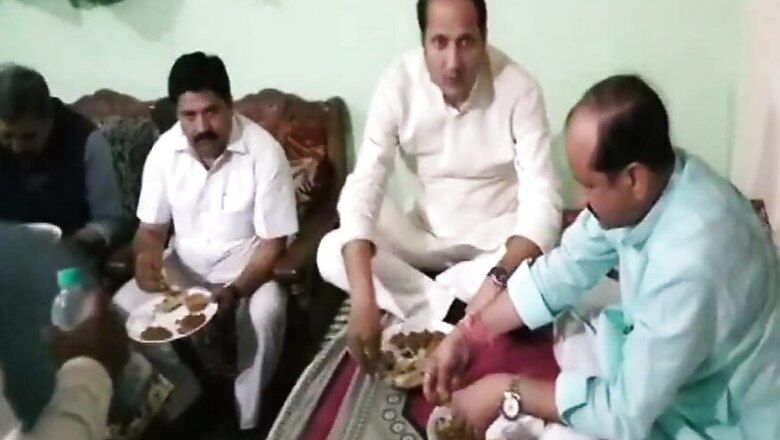
views
BJP leaders and ministers, who belong to the ‘higher’ castes, have been visiting Dalit households to dine with them. In doing so, they are responding to Prime Minister Narendra Modi’s appeal to provide social respect to Dalits.
But the caste samskara of some of the leaders reflects in how they go about carrying out such socio-political acts, which are largely criticised by print and electronic media.
In some cases, we found a few slip-ups. Some of them ate in Dalit houses but the food was prepared by the village development officer in savarna kitchen (kitchen of the ‘upper’ caste); they spent the night in Dalit hamlets but brought fans, coolers and comfortable mattresses from the city.
These contradictions and superficialities sometimes make their activities the target of criticism.
“We should not go to Dalit houses to eat but invite them in our kitchen. We are not Bhagwan Ram that our visit to their houses will make them pavitra,” said BJP leader Uma Bharti.
RSS ideologue Manmohan Vaidya advised BJP leaders against making a propaganda of such visits. BJP MPs Udit Raj and Savitri Bai Phule also criticised the leaders over controversies during such visits and suggested that this would not help the party woo Dalit votes as they now want proper share in power. Merely dining together will not satisfy them, they suggested.
Inter-caste dining or Samarasta Bhoj was initiated as a socio-cultural activity by the Rashtriya Swayamsewak Sangh (RSS) in the 1980s to provide social respect to Dalits and bring them within their own fold. It worked well for the RSS and they reached out to various Dalit castes through such activities.
This is not a new phenomenon. The Arya Samaj also used this method to provide social respect to the Dalit communities in various parts of India. It introduced a new egalitarian consciousness by organising such initiatives. Due to these efforts by the Arya Samaj, a section of Dalits acquired social mobility that led to their social empowerment.
Such efforts tried to weaken the clutches of caste consciousness in North Indian society.
Many other social, cultural and religious groups successfully used inter-caste dining as a method to reach those at the grassroots level. It has been tried for many decades by various social, cultural and religious groups, but never became the point of heated debate as it is these days.
It became an issue of propaganda when it entered the domain of politics and was simultaneously captured by media lens.
Rahul Gandhi and congress tried to use this method around 2010 to woo Dalit support in Uttar Pradesh. But it received the same criticism as it is receiving now when BJP is trying to adopt this method among Dalit communities.
One may observe similar criticism and similar results in contemporary BJP led Samrasta Bhoj and Congress led Samrasta Bhoj during 2010. It is quite interesting that two oppositionally situated parties are using same tools and finding similar result of Samrasata Bhoj campaign.
It is happening because it is a social act, when it turns a political act, it loses its real impact. When this social act is implemented by politicians who have not yet changed their social habits and samskaras, they could not make it with that zeal, which such sensitive acts need. So they get exposed and make themselves and their parties face severe criticism. Some of these leaders are not exposed to the tough life and are still in the grip of caste consciousness. Some of them perceive such acts as doing some sort of kindness or charity to the Dalits by visiting their houses.
Social actions bring changes over a period of time.
It is true that dining with Dalits may help in the abolition of caste in Indian society. Ambedkar and Kanshiram both had a strong belief that Beti-Roti Sambandh ( intercaste dining and intercaste mairraiage) will certainly help in eradication of the caste system in India. It will ultimately help in the making of egalitarian and equal society.
Inter caste dining alone is not sufficient for the abolition of caste system. Few Dalit thinkers are of the opinion that inter caste dining alone will turn merely as symbolic act. It may not be effective in bringing social change like abolition of caste. The BJP claims that intercaste dining with Dalits is linked with providing respect to the Dalit community. But now, Dalits are eager for a more substantial effort as they hope to get their share in the power and not merely symbolic respect.
(Badri Narayan is a Social Scientist at GB Pant Social Science Institute in Allahabad. Views are personal)
















Comments
0 comment